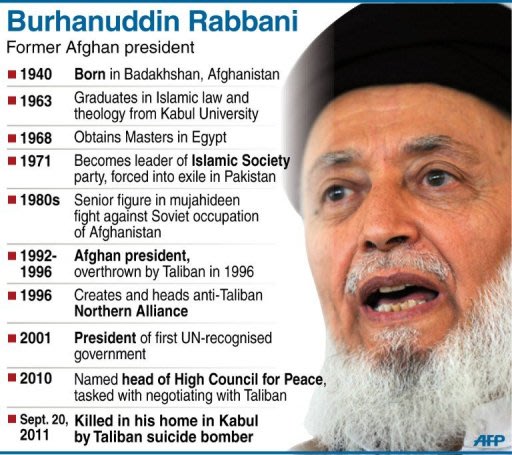M WAQAR..... "A man's ethical behavior should be based effectually on sympathy, education, and social ties; no religious basis is necessary.Man would indeed be in a poor way if he had to be restrained by fear of punishment and hope of reward after death." --Albert Einstein !!! NEWS,ARTICLES,EDITORIALS,MUSIC... Ze chi pe mayeen yum da agha pukhtunistan de.....(Liberal,Progressive,Secular World.)''Secularism is not against religion; it is the message of humanity.'' تل ده وی پثتونستآن
Wednesday, September 21, 2011
Afghans protest peace broker's assassination
Hundreds of Afghans protested against the assassination of Burhanuddin Rabbani, chairman of the government's peace council whose murder threatens to fling the country into further turmoil.
President during Afghanistan's bloody 1992-96 civil war and a warlord with a chequered human rights record, the 71-year-old Rabbani was killed at home by a Taliban suicide bomber wearing explosives in his turban, police said.
Although there has been no official word from the Taliban, his killing deals a heavy blow to already remote hopes of an imminent end to 10 years of fighting between Islamist insurgents and the Afghan government backed by Western troops.
President Hamid Karzai was Wednesday rushing back to Afghanistan, cutting short a visit to the UN General Assembly in New York after meeting US President Barack Obama as preparations were being made for Rabbani's funeral.
It was arguably the most high-profile political assassination since the 2001 US-led invasion dislodged the Taliban, two months after President Hamid Karzai's younger brother was killed in the Taliban's southern heartland.Head of Karzai's High Council for Peace for 11 months, Rabbani fronted the government's attempts to broker peace with the Taliban, but his efforts so far appeared to come to little despite growing US interest in a settlement.
Nevertheless the assassination of such a high-profile Karzai ally, at his home close to the US embassy in allegedly the most protected part of the capital, underscores the sharp deterioration in security in Afghanistan.
Regardless of whether Rabbani was even capable of brokering peace in a country ripped apart by three decades of war, his killing is a deep symbolic blow to the government's efforts and highlights the perceived strength of the insurgency.
As a Tajik, Rabbani's killing may also further upset the delicate and at times increasingly fraught relations between Afghanistan's different minority ethnic groups and the dominant Pashtun community.
On Wednesday, several hundred people carrying pictures of Rabbani and banners gathered near his house to remember him and protest against his killing, an AFP photographer said. Many wore black headbands in mourning.
Government forces stepped up security in the diplomatic zone where Rabbani?s house is located, with cars barred from entering the area and police stopping and searching many people on foot.
People gathered at the gate of Rabbani?s house to sit and recite the Koran. A stream of government officials also attended to pay their respects.
It was not immediately clear whether the funeral would be in Kabul or Rabbani's home province of Badakhshan in northeast Afghanistan.Karzai, whose relations with the West have soured drastically since his 2009 re-election mired in fraud, insisted that Rabbani's assassination "will not deter us from continuing down the path we have started".
Obama, who wants all American combat troops out of Afghanistan in the next three years, said Afghans must be allowed to live "in freedom, safety, security and prosperity".
NATO's Anders Fogh Rasmussen, who heads up the alliance leading much of the foreign military effort to reverse the Taliban momentum, said those behind the killing "will not prevail".
UN Secretary General Ban Ki-moon expressed shock over the killing and underscored the world body's commitment to "supporting Afghanistan and its people attaining peace and stability"Members of his entourage said the attacker and an accomplice were invited to the villa as emissaries bringing "special messages" from the Taliban.
The bomber hugged Rabbani in greeting and detonated his explosives.
Although there were conflicting reports of who brought in the bombers, one source said they arrived with Mohammad Massom Stanikzai, one of Rabbani's deputies, who was one of four people wounded in the attack.
Peace Council member Fazel Karim Aymaq said the two visitors claimed to have "special messages" from the Taliban and were thought to be "very trusted".
"One of them put his head on the shoulder of Rabbani and detonated the explosives hidden in his turban, martyring Rabbani," Aymaq added.
An anonymous source said Rabbani had just returned from Dubai especially to meet the two, seemingly senior Taliban leaders.
It was the second high-profile attack in a week in central Kabul, following a 20-hour siege targeting the US embassy that killed 14 people on September 13.
The 140,000 US-led foreign troops in Afghanistan have another three years to try to reverse the Taliban insurgency before the last of them are scheduled to withdraw in 2014.
The US military's top officer Admiral Mike Mullen insisted assassinations would not force a change in war strategy.
The High Council for Peace, Karzai's brainchild, was intended to open a dialogue with insurgents who have been trying to bring down his government since the US-led invasion overthrew their regime, but has seen little success.
The 68-member council was inaugurated in October 2010. At the time, Rabbani said he was "confident" that peace was possible.
But according to Human Rights Watch, Rabbani was among prominent Afghans implicated in war crimes during the brutal fighting that killed or displaced hundreds of thousands of Afghans in the early 1990s.

No comments:
Post a Comment